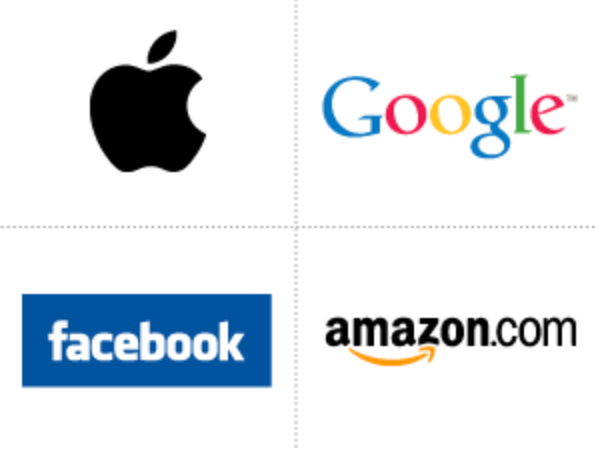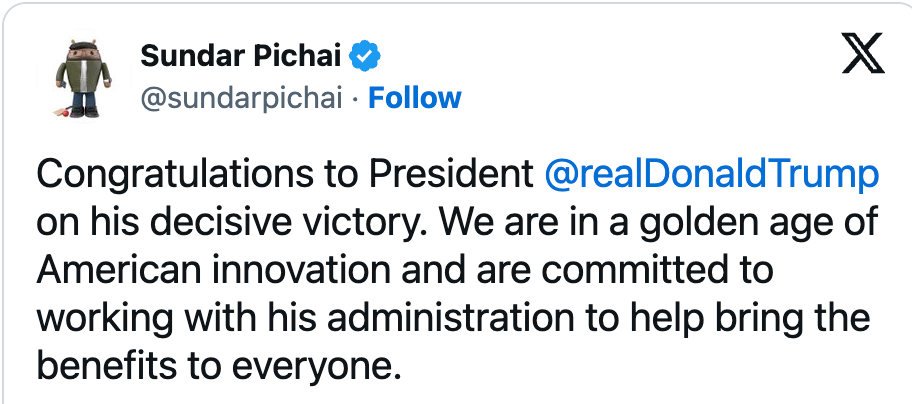Don't expect the tech platforms to help us this time.
Some thoughts on how resisting the next Trump administration will differ from the previous one.
NOTE: This is the first in a series of three essays that I’ve sketched. The final essay will discuss reasons for hope. This one and the next are more dismal in tone. I think that’s ultimately appropriate — there is hope to be found, but it’s a long way off.
Here’s something I once believed that is no longer true: “A nervous monopolist is a well-behaved monopolist.”
That line comes from an essay I wrote in 2018, “The Infowars Purge, and Life among Responsible Information Monopolies.” The essay, in turn, was built out of a presentation I gave at the 2018 International Communication Association Annual Meeting.
2018 was the height of the Cambridge Analytica scandal. Many of my disciplinary colleagues were seizing the moment to call for greater government regulation of social media. I agreed with the ultimate goal, but found something fantastical about their timing. The punchline, in both the presentation and the essay, was the same:
For those who have determined that the solution is “the government should regulate/break up Google and Facebook,” let me ask: which government? This government?
Which alumnus of the Trump golf and real estate empire ought to be in charge of regulating digital media platforms?
The creative fiction at the heart of “regulate the monopolies” arguments is that they pretend we are talking about a generic government. What’s missing today is not a failure of imagination or a failure of courage from public intellectuals or government officials. The U.S. government is facing a crisis of competence. The Consumer Financial Protection Bureau, the State Department, the EPA, and every other agency is being hollowed out. Rebuilding our regulatory capacity is going to be a multi-year, potentially a multi-DECADE affair.
I argued that, in the absence of administrative competence, the best we could temporarily hope for was benevolence from the digital platforms. A reputation-conscious Facebook or Google was likely to hire more trust and safety professionals and enforce its terms of service more strictly. The time for regulation and antitrust suits would come later, once we had rebuilt after the Trump years.
I still think the argument holds up well for that moment in political time. It fits with Kate Klonick’s argument that those years would turn out to be the golden age of tech accountability. Facebook and Google treated electoral misinformation and hate speech online as significant problems. They set up well-funded programs and worked with civil society actors to (imperfectly, voluntarily) address it. And then Biden was elected, and we got Lina Khan as chair of the FTC. Khan spent her tenure rebuilding regulatory capacity, reclaiming the proper role of government, and bringing antitrust suits against all the platforms.
It was precisely what I had hoped for. Partner with the platforms in the short-term, reassert the role of government in the medium-term. We should care about the timing. We should want a competent, serious professional like Lina Khan regulating the digital media platforms, not Jared Kushner or some hack from the Claremont Institute.
But, [cue the ominous background music] to repeat myself, “Rebuilding our regulatory capacity is going to be a multi-year, potentially a multi-DECADE affair.” Regulatory capacity can’t be rebuilt overnight. Major antitrust cases move slowly, deliberately.
We only got four years. And the tech barons, having gotten a taste of administrative competence, decided it would be easier to take their chances on an authoritarian who is easily flattered. It wasn’t enough. And we won’t be able to rely on the platforms anymore.
Here’s what I can clearly see today that was less evident in 2018:
A nervous monopolist is only well-behaved if the right people are making them nervous.
Facebook and Google and Amazon and Apple don’t have to worry about direct user revolt. Throughout the techlash, their reputations turned to shit, but their user base and profits skyrocketed. That’s the thing about monopoly power: the lack of competition means there isn’t anywhere for users to go.
What the big tech platforms always had to fear was the threat of government regulation. They were relatively well-behaved in 2018 and 2020 because they had to worry that the Democrats, if re-elected, would pursue aggressive regulation. Indeed, there are plenty of bills in Congress that could have been passed — bills that would have been good for citizens/consumers — had the platforms not shown that they have the capacity to protect trust and safety through voluntary measures.
But Trump will never stand for reelection. The platforms don’t have to be nervous about their user base, or about an FTC that strictly enforces existing law, or about Democratic congressional majorities anymore. The only thing they have to be nervous about is getting on Donald Trump’s bad side.
And so, as Emma Roth covered earlier this week, they are lining up to offer enthusiastic congratulations.
I can’t say their fears are unwarranted, either. Donald Trump is planning to put Elon Musk in charge of “government efficiency.” Anybody wanna bet on whether he’ll recommend fat government contracts for all his (and his main investors’) companies, while promising savings by ending contracts to his competitors?
These are global platforms. They all know how to do business with competitive authoritarian regimes. I’m pretty sure rule #1 is “don’t do anything to piss off the autocrat.”
Making matters worse, the post-techlash years have left the tech billionaires aggrieved and petulant. In 2018, they were worried about attracting and keeping talented workers. In 2024, they resent the hell out of their workforce. In 2018, they were trying to manage techlash journalism by showing that they took their power and responsibility seriously. In 2024, they resent tech journalists and are “done with politics.”
We are on our own here. During Trump’s first term, we could rely on the courts, and rely on the press, and rely on the tech platforms. None of them were perfect allies, but all of them had significant structural power and incentives to take the crisis seriously.
Trump has the courts now. Every legal challenge will be a series of dice-rolls, hoping to draw a non-Trump judge and a non-Trump appeals panel, all while dodging the Trump Supreme Court weighing in through its shadow docket.
Major media outlets have already signaled they will obey in advance. There will be some tremendous, courageous acts of journalism in the coming years. But they will increasingly originate from smaller outlets.
And we should expect the platforms, too, to be no help. They were only allies last time because their self-interest aligned with protecting electoral democracy.
A nervous monopolist is only a well-behaved monopolist if the right people are making them nervous. Hard times are ahead. Much harder than last time.






As you know, the last time this country was in this position it took Black Tuesday and a Republican administration that couldn't imagine interfering with the economy to break the back of the Guilded Age and the Republican party, and that only lasted 30 years, that long only because of WW2. The institutions set up to prevent it happening again will focus on propping up the top and let the market "purge the rottenness" at the bottom. We'll see how effective that is.
The American voters in their infinite wisdom prefer to alternate the Presidency between parties, and ideally hobble it with a divided Congress. Trump is the wild card in all this, he will do his level best to remain in power, Constitution or no, and the Republican party will back him 99.99%, allowing a few complainers who will be dealt with like Liz Cheney. Nobody has a fucking clue how all this will play out. His health, attention span, and ego, world events, Russian/Iranian/Chinese skullduggery, and the Stock Market will all contribute to events. The Democratic party is a player too, but they need to admit the game has fundamentally changed to have an impact in it. Even of Trump is somehow "out of action" the Republican party will remain commited to the tactics and goals of what we call Trumpism. This is what "living in interestjng times" feels like.